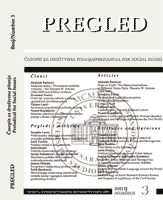Nada kao istina / Povezanost različitih vremena / Stil Theodor W. Adorno (1969-2009) kao kritičar moderne
Hope as Truth/The Interconnectedness of Different Times/Style Theodor W. Adorno (1969-2009)
Author(s): Abdulah ŠarčevićSubject(s): Philosophy
Published by: Univerzitet u Sarajevu
Keywords: Critical theory of society; negative dialectics; philosophy and sociology; new critical models; critique of the culture of mass society; society; revolution and criticism; modern civilization; the art of despair; hope and truth
Summary/Abstract: As we have seen, Theodor Adorno, the protagonist of negative dialectics, remarks that thought in this industrial and bourgeois civilization has “lost touch with its object and the sense of proportion.” Once one begins to sacrifice thought and the critical intellect there is no natural end to it, for it is difficult or impossible to suppose that any concession, as he puts it, could satisfy the “insatiable appetite for the non-spiritual” – the non-spiritual that is most effectively expressed in the triumph of positive science, scientocracy and bureaucracy. There is no doubt, then, that Adorno shares Brecht’s view and resolves to deal with politics, not its surrogate; with the politics of historical experience that allows him to remain absolutely honest with himself. From all that we know and suspect, theatre is then more than a change of mind-set. It is logical and consistent for Adorno to conclude that intrinsic to this mind-set are elements of negative dialectics, and that it is therefore the best corrective to the “new trends” in the theatre, the theatre that is now a substitute for “reality,” as in happening theatre, “which is mainly staged by actionists.” Apparently here too we shall encounter Adorno’s dialectical formulation of the relationship between theory and practice. In a way, he rejects the classic speculative definition, thereby distinguishing himself from Marx. Theory and practice are neither directly identical nor absolutely different; their relationship is in fact one of discontinuity. This paves the way for Adorno to a new, modern dialectical relationship; there is no fixed route from practice to theory. Theory itself, however, belongs to the social structure, and yet at the same time it is autonomous. There is no doubt that these critical views express the discontent not only of Adorno’s negative dialectics but also of the various forms of contemporary leftism, of the general revolt against the ever deeper and more destructive dominance of labour/capital as total repression. Adorno thus belongs to the group of modern intellectuals – along with Max Horkheimer, Walter Benjamin, Berthold Brecht, and Herbert Marcuse – who were among the first to understand the metaphysical roots and motivations of both empirical capitalism and actually existing socialism. All this, however, demands that Adorno distance himself from the leanings of Benjamin and Brecht, who, as Irving Fetscher put it, were inclined to “the hope that the communist substance would triumph over its brutal degradation.”
Journal: PREGLED - časopis za društvena pitanja
- Issue Year: L/2009
- Issue No: 3
- Page Range: 13-51
- Page Count: 39
- Language: Bosnian

